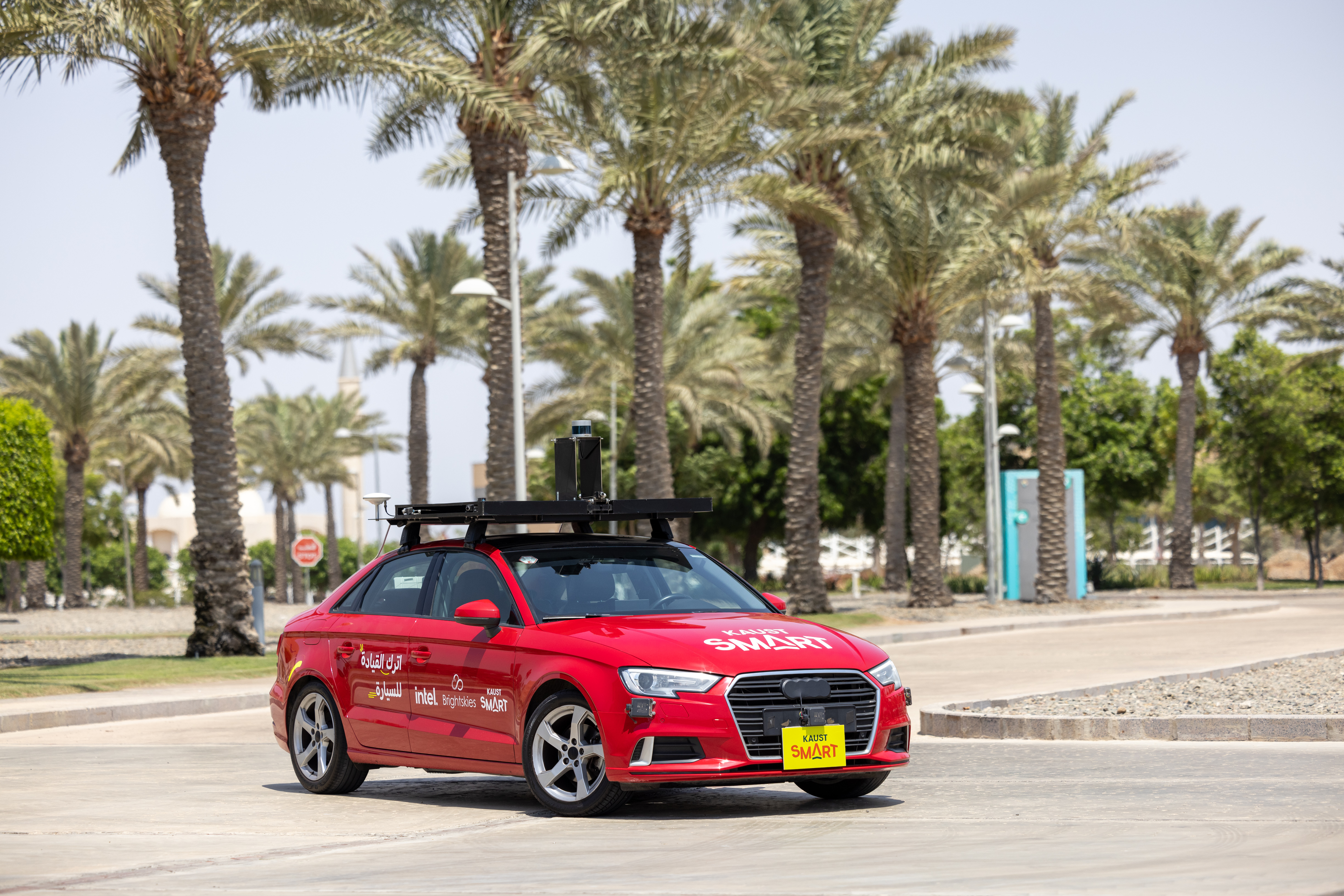KAUST, Intel, and Brightskies collaborate to develop self-driving mobility platform

REDD, a collaborative self-driving mobility platform developed between KAUST, Intel and Brightskies
KAUST Smart is continually pushing the boundaries of innovation with technologies aimed to improve quality of life in the home and city. On June 12, KAUST Smart met with external partners, government agencies and companies from the private sector to launch REDD, a self-driving pilot project that puts research innovations in artificial intelligence (AI) to the test in proof-of-concept autonomous vehicles.
REDD is the outcome of a strategic collaborative initiative between KAUST Smart, Intel and Brightskies to raise the bar of the autonomous mobility challenge by converting a conventional car into a self-driving car with integrated AI software. The long-term vision of the partnership is to have an onging, collaborative platform for research exchange to improve self-driving technologies — goals in alignment with the objectives of the Kingdom of Saudi Arabia's Vision 2030.
The three entities have combined their efforts, leveraging KAUST expertise and utilizing its campus as a living lab for this pilot project. KAUST also participated in the design of the user experience. This project builds on prior "firsts" in automation at KAUST. In partnership with international autonomous vehicles makers, KAUST was the first institution in the Kingdom to test autonomous bus shuttles on its campus, and extended autonomous research to drones and self-driving lockers to test last mile delivery.
Participants from KAUST, Intel and Brightskies convened at the KAUST Research & Technology Park building for the launch of REDD, a self-driving mobility platform developed between KAUST, Intel and Brightskies. Photo: KAUST
Brightskies has been the main developer of the self-driving system, powered by Intel® NUC platforms.
"The self-driving mobility platform provides a capability to develop an ecosystem of talent, research and applied solutions within the region. It's a great step towards tackling self-driving challenges. It's also a platform that allows new and innovative ideas to grow," said Mohamed Abdel-Aal, Director of KAUST Smart at KAUST.The KAUST vehicle will use a Beta version of BrightDrive, a self-driving system developed inhouse by Brightskies and initially launched in 2020. KAUST researchers are expected to use this vehicle as an innovation platform in order to deploy and test new techniques for a better road experience. BrightDrive contains features required for the safety of the autonomous trip and optimal user experience, including environment sensing and perception, centimeter level localization, and high-definition (HD) mapping, path planning and motion control.
Researchers will have access to data gathered by the self-driving car to help fine-tune their existing models. Data coming from an actual car tested on a road instead of from a synthetically created scenario will advance research and, in turn, vehicle responsiveness toward the goal of making self-driving cars efficient, reliable and safe.
"The advanced processing power and seamless integration of sensors over the Intel® NUC could make this innovation a reality," said Hossam Yahia, Vice President of Autonomous Driving at Brightskies.
Ahmad Alabduljabbar, Intel Saudi Arabia General Manager, and Ahmed O. Ahmed Mohammed, KAUST Smart System Technician give a thumbs up for the REDD self-driving mobility platform, developed between KAUST, Intel and Brightskies. Photo: KAUST
The KAUST campus is an ideal test site because it represents a small city with the kinds of diverse driving scenarios that a self-driving developer needs, including standard road features such as traffic signs, traffic lights and driving laws that prioritize the safety of humans, pedestrians and bicyclists. To date the vehicle has been traveling through the small city day and night, encountering unexpected scenarios, and the advanced AI system has been successfully able to detect the environment and react in a safe and efficient way.
"Intel is very excited to collaborate with KAUST and Brightskies on AI developments for autonomous driving — a collaboration that we believe is aligned with and will support Saudi's Vision 2030," said Ahmad Al Abduljabbar, General Manager of Intel, Saudi Arabia. "The pilot project will also enrich the local research talent with a customizable platform for their algorithms, which will prepare them to play a role in the global automotive industry."

